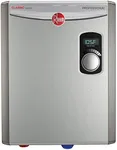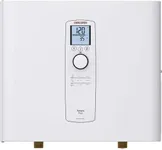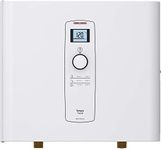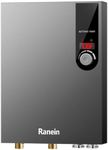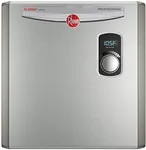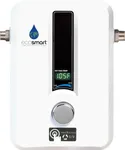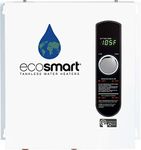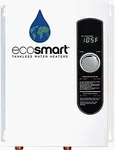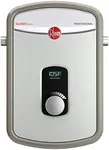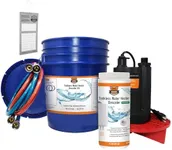Buying Guide for the Best High Capacity Tankless Electric Hot Water Heaters
Choosing the right high-capacity tankless electric hot water heater can significantly impact your comfort and energy efficiency. These heaters provide hot water on demand without the need for a storage tank, making them ideal for households with high hot water usage. To make an informed decision, it's important to understand the key specifications and how they align with your needs. Here are the main factors to consider when selecting a high-capacity tankless electric hot water heater.Flow Rate (GPM)Flow rate, measured in gallons per minute (GPM), indicates how much hot water the unit can deliver at a time. This is crucial because it determines whether the heater can meet your household's hot water demands. For example, a flow rate of 3-5 GPM is suitable for small households or single applications like a shower, while 6-10 GPM is better for larger households with multiple simultaneous hot water needs. Assess your household's peak hot water usage to choose a unit with an appropriate flow rate.
Power (kW)The power rating, measured in kilowatts (kW), indicates the heater's capacity to heat water. Higher kW ratings mean the unit can heat water more quickly and handle higher flow rates. For instance, units with 18-24 kW are suitable for moderate hot water needs, while those with 25-36 kW are better for larger households or homes with high hot water demand. Consider your household size and hot water usage patterns to determine the right power rating for your needs.
Temperature RiseTemperature rise refers to the increase in water temperature as it passes through the heater. This is important because it affects how hot the water will be when it reaches your tap. A higher temperature rise is needed in colder climates where incoming water temperature is lower. For example, a unit with a 30-40°F temperature rise is suitable for warmer climates, while a 50-70°F rise is necessary for colder regions. Consider your local climate and desired hot water temperature when choosing a unit.
Energy EfficiencyEnergy efficiency measures how effectively the heater converts electrical energy into hot water. Higher efficiency ratings mean lower energy consumption and reduced utility bills. Look for units with efficiency ratings of 90% or higher for optimal performance. Consider your long-term energy savings and environmental impact when evaluating efficiency.
Installation RequirementsInstallation requirements include electrical specifications, space, and ventilation needs. Tankless electric heaters typically require a dedicated circuit and specific voltage, so ensure your home's electrical system can support the unit. Additionally, consider the space available for installation and any ventilation requirements. Consult with a professional to ensure your home meets the necessary installation criteria.
Warranty and SupportWarranty and support are important for ensuring long-term reliability and peace of mind. A good warranty covers parts and labor for a significant period, typically 5-10 years. Additionally, consider the availability of customer support and service options. Choose a unit from a reputable manufacturer with a strong warranty and reliable customer support to ensure you can get help if needed.
